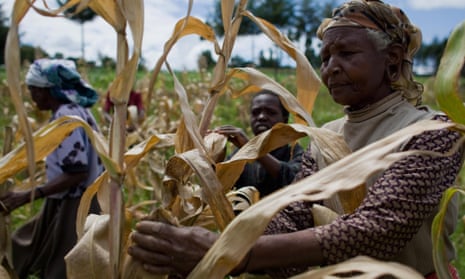Shenggen Fan, director general, International Food Policy Research Institute, Washington DC, @ifpri
Recognise the different types of family farmer: Smallholders live in different stages of economic development. First is the subsistence farmer without much potential to move to commercialisation. Second is the subsistence farmer with potential. The third is the family farmer that has already made moves to commercialisation. We must have different strategies for different types of smallholders to move them to profitability.
Peter Ton, food security expert, Cordaid, The Hague, Netherlands, @cordaid
Invest in education and training: Many family farmers could significantly increase their production tomorrow if trained about the basics of agriculture, agroecology, accounting and marketing. Such education and training is still lacking in many places, or only reaches a limited number of smallholders.
Tim Aldred, head of policy and research, Fairtrade Foundation, London, UK, @timaldredpolicy
Create incentives for younger generations: Young people are leaving farming in many areas of the developing world because they don’t believe it offers them a long term future. This is understandable when their work is so marginalised, but it is a challenge that we must address. We need to get serious about paying for the true costs of sustainable production, and investing in communities.
Prepare for uncertainties: Market behaviour, weather, and personal circumstances mean that family farming is never going to be an easy way of life. If we can help address uncertainties - at least to some extent - then it can at least allow farmers a greater degree of control and ability to plan their future. Business can play a role here by committing to longer term relationships with smallholders they buy from; by agreeing multi-year contracts, longer term commitments on price, and providing advice on where markets are going.
Marina Apgar, knowledge sharing and learning scientist, CGIAR, Penang, Malaysia, @AAS_CGIAR
Don’t throw tech innovations at a problem: Just as important as what we introduce is how we do it. Simply plugging in a technology is not enough. What is required is an approach that will build local capacity in the process, recognise the need for adaptation, and ensure long term sustainability.
Richie Alford, director of research and impact, Send a Cow, Bath, UK, @SendaCow
Promote diversification for sustainable futures: Single commodity farmer producers are laying themselves open to the vagaries of global markets, and (unfair) competition with others. But the producer can also look to supply other markets, using land in other ways. For example, looking at inter-cropping as an opportunity for diversified income.
Mandla Nkomo, operations director, TechnoServe, Johannesburg, South Africa, @TechnoServe
Identify suitable methods of financial inclusion: Formal institutions do not have products that match the profile and needs of family farms. We need to leverage corporations who already have these formal relationships to be more experimental in packaging financial access products. For smallholder farmers that require more sophisticated financial products or larger amounts of capital, informal financial institutions can serve as a stepping-stone for their members to graduate to commercial financing.
Daniela Gamble, project officer - Latin America coffee, Twin, London, UK, @twinfairtrade
Promote women’s empowerment: There is an imbalance between the contribution women make and their control over, and access to, income, finance, technical assistance and decision-making. Despite women providing the majority of the labour at farm level, when it comes to delivering the crop to market and completing the sale, women are often excluded. These tasks are mainly done by men, who subsequently retain much of the control over household income. As a result, the role played by women is often unrecognised, unpaid, invisible.
Tackle food security and conservation together: When producer organisations pursue environmental sustainability with good agricultural practice, they are thinking of food security. Without sustainable farming practices we will deteriorate our soils, water and the environment as a whole, thus deteriorating the land that food security depends on. Food security and environmental sustainability are and should be linked to each other. It is not a trade-off.
Chris Henderson, senior policy and practice adviser in agriculture, Practical Action, Rugby, UK, @Chris_P_Hen
Make smallholders central to policy: Family farmers are the key to just and sustainable development. They must not be bypassed, but rather be the focus of development policy. They should be seen by policymakers as the main part of the solution to global food security, rather than the problem.
Read the rest of the discussion on the live Q&A here.
Read more stories like this:
The truth about feeding 9 billion people is millions will have to feed themselves
Why ‘climate-smart agriculture’ isn’t all it’s cracked up to be
How to ... get female voices into farming research
Advertisement feature: Land rights, not land grabs, can help Africa feed itself
Join our community of development professionals and humanitarians. Follow @GuardianGDP on Twitter.

Comments (…)
Sign in or create your Guardian account to join the discussion